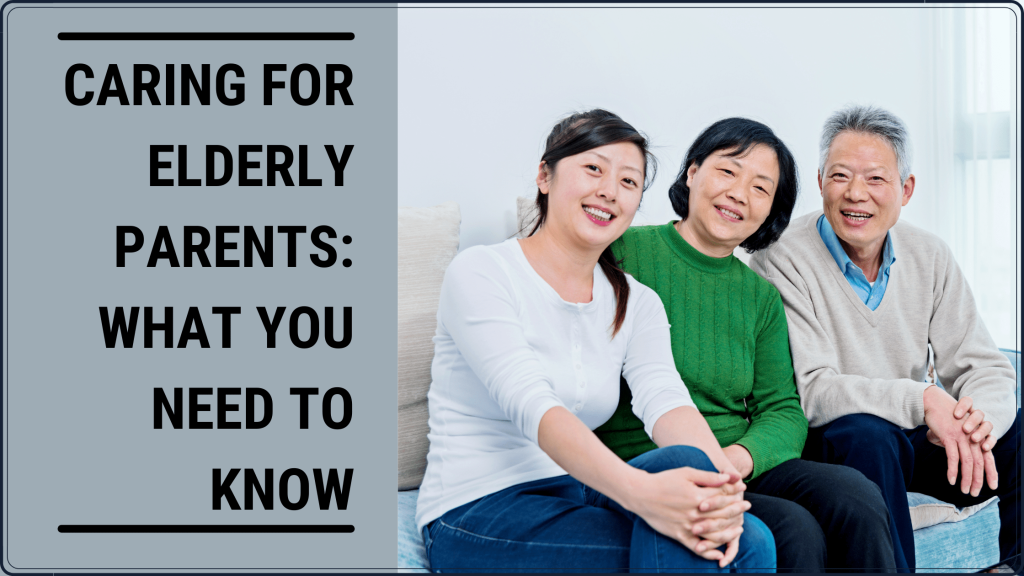Caring For Elderly Parents: What You Need To Know
Caring for elderly parents is a labor of love, but knowing what to expect before you take on this role can help.
Older adults are living longer thanks to improved technology, healthcare services, and quality of life. But as many people are finding, living longer doesn’t mean older adults retain the ability to care for themselves. Even older adults in good health may require extra assistance with routine tasks as they age. Because of this, 49% of adult children are caring for elderly parents.
So before you become a caregiver for your parents, there are a few things to consider.
14 Factors To Consider Before Becoming Family Caregiver
What You Should Know Before Caring For Elderly Parents

Family Caregiving Is Physical And Emotional
It’s not uncommon for adult children caring for elderly parents to do so out of a sense of responsibility or even guilt.
Despite these compelling emotions, you may not be fully ready for the emotional or physical strain that comes with caregiving.
For example, caregivers often assist with tasks that require lifting. Unfortunately, family caregivers who aren’t used to these motions frequently injury themselves in the process.
So consider your physical strength. Can you help your parent get in and out of their bed, chair, or tub?
In addition, you may have to administer your parent’s medication, including injections, or change and dress wounds.
If you question your ability to accomplish these tasks, there is nothing wrong with hiring a professional. A trained caregiver ensures your parent’s needs are fully met and gives you peace of mind.
Besides, there are many other ways to support your loved one, so don’t feel guilty for not taking on this role.
Family Caregiving Is A Significant Time Investment
Caring for elderly parents calls for a significant time investment that can be difficult for some family caregivers to grasp.
For example, in 2011, the Gallup-Healthways Well-Being Index found that each month, the average caregiver spends:
- 13 days on tasks like administering medication, providing transportation assistance, laundry and housekeeping, preparing meals, or shopping;
- 6 days on personal care tasks such as feeding, grooming, dressing, bathing, toileting, or walking;
- 13 hours looking up care services or information about their loved one’s health conditions, coordinating healthcare visits, or handling financial tasks.
In many cases, you will have to modify your routine to align with theirs. For example, taking your mom to a doctor’s appointment or even the salon would likely be a bigger priority over other tasks you would otherwise do.
Another critical point to consider is how this time investment and routine change will impact your family. It’s not uncommon for family caregivers’ children and spouses to feel neglected when your duties consume most of your time.
Moreover, it’s crucial that you take preventative steps to prevent caregiver burnout. This means actively creating guilt-free breaks and personal time.
Doing so can help ease negative emotions like frustration, anger, or resentment and help you recharge, so you continue to provide the best possible care.
Lastly, consider that you might care for your parents longer due to increased lifespans. So, consider the long term and how long you will be a caregiver.
And again, if you don’t think you can support your loved one as long as you expect, there is nothing wrong with getting professional assistance.
Support Groups Are A Necessity
A robust support system is essential for anyone caring for elderly parents. The strongest ones consist of good listeners who offer advice and support when you seek it out.
While your siblings or other relatives may be the first people who come to mind when you think of your main support group, they may not always be there when you need them. For this reason, it’s a good idea to meet other caregivers in your area.
A quick Google search can help you find local groups that meet regularly, both in-person and online.

Family Caregivers Must Create A Backup Plan
It’s essential to have a backup caregiver in place in case something happens to you. What if you become ill or can’t reach your parent because of school or work?
The backup caregiver could be a sibling, another relative, a trusted neighbor, or a family friend. It’s also worth researching local in-home care agencies that can assist when you need it.
Family Caregivers Must Find Work/Life Balance
A 2016 AARP report found that 60% of caregivers worked part-time or full-time jobs in 2014.
The researchers noted that some working caregivers who lacked “the supports and protections needed to manage their dual responsibilities” were forced to “make changes in their work life, especially if they cannot afford to pay for outside help for their care recipient.”
Since caring for elderly parents often cuts into family caregivers’ workdays, it’s no surprise that 61% of working caregivers make “one or more workplace accommodations, especially those workers with the most intensive caregiving situations.”
But unfortunately, working less or leaving the workforce to care for a parent can exacerbate financial pressures for you, your family, and your parent.
So before you start caring for elderly parents, talk to your employer about how your role will impact your work. Be clear and upfront about your situation so you can find a solution that meets both of your needs.
In the same vein, research employer-sponsored home care benefits such as the Family and Medical Leave Act.
Family Caregivers Must Be Honest About Their Abilities
It’s not uncommon for family caregivers to dive into their role, thinking they can do it all. But in reality, this role can require extensive research about caring for elderly parents.
Look for resources in your area, such as your local Area on Aging, which offers guidance and assistance about eldercare to help you meet your parent’s needs.
You should be honest with yourself and your skillset, which you can improve through caregiver training and certification. But if you lack the time or resources for this, a professional may be a more viable, long-term option for you and your parent.
In addition, a trained, professional caregiver understands common conditions that affect seniors and can recognize early signs for many diseases before they progress.
Family Caregivers Must Understand Their Parent’s Health Conditions
According to the Centers For Disease Control and Prevention (CDC), 85% of seniors have at least one chronic health condition, while 60% have two or more.
When caring for elderly parents with a chronic disease, understanding their condition is intrinsic to your job.
Talk to your parent’s doctor about your parent’s condition and request resources to help you learn more about it.
Not only does educating yourself help you know what to anticipate, but it can also help you make sounder choices about your parent’s care.

Family Caregivers Must Recognize Behavioral Changes
Adults often undergo personality and behavioral changes as they grow older. Seeing your parent go through these changes is difficult, but experiencing them first-hand when caring for elderly parents can be even more distressing.
As a family caregiver, you balance a thin line between caregiver and child. If your loved one comes across as demanding or uncooperative, allow yourself to take a step back and empathize with them.
Put yourself in their position: They are a parent who can no longer care for themselves and must rely on their adult child to assist them.
This is especially true if your loved one has Alzheimer’s or dementia. Cognitive loss creates confusion, which can lead to fear or anger. In turn, your loved one may lash out or have outbursts that, while uncharacteristic, are no less hurtful to hear.
You should consider how you might handle these situations. Of course, it’s hard not to take things like yelling personally, but you can try to minimize their frequency by determining which factors trigger these behaviors.
If your parent becomes upset, the best way to manage the situation is:
- Staying calm
- Supporting their feelings
- Smiling
It’s important to step back so you can formulate your thoughts. Even a short break can help you better communicate your genuine concerns and desire to care for your parent.
Family Caregivers Must Monitor Their Parent’s Mental State
Declining cognitive skills like planning, organizing, and decision-making often occur before memory loss. In many instances, this is the first sign that your parent needs a caregiver.
So before you step up as a family caregiver, consider how your parent’s worsening cognition may impact your day-to-day.
Your parent may lose objects in unusual spaces such as the fridge, or you might have to continuously monitor their phone and internet usage to protect them from scammers. These are just a couple of the many things that can add up and leave you feeling overwhelmed.
On top of that, as a caregiver for your parents, you are also responsible for entertaining them. This typically means finding interesting ways to stimulate their minds and keep them engaged even as their cognition worsens.
Family Caregivers Must Assess Their Parents’ Living Conditions
Caregiving calls for extensive financial and strategic decisions that can impact your parent and your household.
As a family caregiver, you will find that choosing between aging in place or moving your parent into a new home is among the most challenging decisions you can face.
While your parent may want to stay in their home, it may not be financially or logistically feasible.
If your loved one moves into your home, you will need to consider how your family’s schedule and noise level will impact them. Chances are, your parent has lived by themselves for many years and could have a difficult time adjusting.
Whether your parent ages in place in their home or yours, you may have to consider taking on home modifications to help them keep their independence and dignity.
Family Caregiving Means Additional Finanical Costs
Caring for elderly parents requires a thorough evaluation not only of your parent’s finances but yours, too.
That’s because when you take on the role of the family caregiver, you also take on extra expenses like prescriptions, home health, or other essentials.
Look for grants and government programs for family caregivers. In addition, talk to a financial advisor who can help you make the most of these benefits, plan for additional expenses, and pinpoint unexpected ones.

Family Caregiving Requires Set Expectations And Boundaries
In a perfect world, you would have no trouble separating your role as a caregiver, following a routine that meets your parents’ needs and fulfilling your other duties.
But as it is, we don’t live in a perfect world. Consequently, family caregivers often face many challenges when caring for elderly parents.
Your loved one may resist your attempts to help, or they may heavily depend on you for every little thing.
Both situations make it challenging to meet their needs and expectations, causing disappointment for both sides.
So before you become a family caregiver, set boundaries and expectations with your parents. This will help minimize the frequency of difficult situations and lower your risk of caregiver burnout.
In the same vein, make sure both parties give each other a chance to feel heard. Strike up a conversation with your parent, asking them to share how they feel to need care and the type of care they require.
Define your loved one’s expectations, then explain your own – making sure to also clarify your limitations in your ability to meet their needs completely.
If you feel yourself getting heated, take a step back before things escalate. If you have difficulty communicating with your parent, consider bringing an unbiased third party to help arbitrate.
Family Caregiving Requires Compromise
Depending on your situation, compromise may be the only way to settle on a solution. However, finding an answer that aligns with you and your parent could also be simpler than you realize.
For example, if your loved one needs transportation assistance multiple times a week, consider driving one day while asking siblings or others to help with the other days.
Not only does this take the burden off your shoulders, but it gives your loved one a chance to socialize with a broader circle of people.
Caring For Elderly Parents? MeetCaregivers Can Help
Just as you are there to support your parents, we are here to support you. If you need a respite break or someone to assist part-time, we can help.
We can match your loved one with a qualified, professional caregiver based on their personality, needs, and level of care.
We create customized care plans based on your loved one’s needs, including:
- Transportation
- Light housekeeping
- Errand running
- Meal planning and preparation
- Medication reminders and administration
- Personal care
- And more
You can call 1-888-541-1136 or contact us online to ask about our process and how we can help you and your family.
For more information about caregiving and seniors, check out our blog.
- 10 Things to Consider Before Becoming Your Parent’s Caregiver, 16 June 2017, www.araglegal.com/individuals/learning-center/topics/caring-for-others/ten-things-to-consider-as-parents-caregiver.
- Mdelegato. “A Family Caregiver’s Guide to Setting Expectations With Parents.” Relevar Home Care, 6 July 2020, relevar.com/caregivers-guide-to-setting-expectations-with-parents/.

